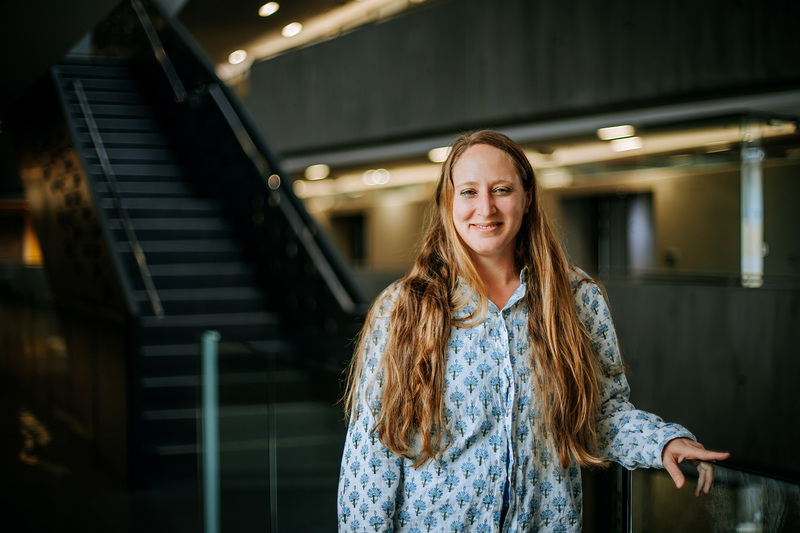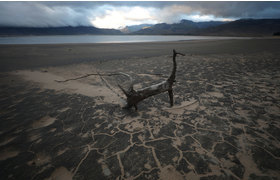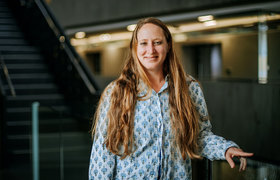Fellowship boost for UCT researcher
07 July 2025 | Story Myolisi Gophe. Photo Candice Lowin. Read time 5 min.
While much of Cape Town was winding down for the summer holidays last December, Dr Amber Abrams kept her laptop open. No beach break, no rest – just the quiet hum of December's downtime and the rush of a last-minute fellowship application that would, unexpectedly, change the trajectory of her work.
“I usually work through Christmas time because it’s a quiet time and I can get work done,” she said matter-of-factly.
That spontaneous application has since paid off. Dr Abrams, a researcher with the University of Cape Town’s (UCT) Future Water Institute, has been awarded a prestigious three-year Climate Sensitive Infectious Diseases (CSID) Network Fellowship to build a community of practice around water-related, climate-sensitive infectious diseases in Southern Africa. She is one of five CSID fellows to be chosen in 2025 out of the 208 applications from over 40 countries around the world.
The CSID Network Fellowship aims to connect researchers, citizens, health workers, and city officials in developing locally relevant solutions to climate-linked health crises, especially in informal settlements. It was created to support local and regional communities of practice in areas affected by CSID, ensuring that research and tool development are grounded in their context and responsive to local needs.
“The people I was working with kept pointing to water access as the most pressing challenge to their health. That really shifted my focus.”
Fellows receive a stipend, travel and event funding; and have access to mentorship and community support to catalyse their own place-based communities and serve as distributed, geographic anchor points to expand the network. Fellows also build local, interdisciplinary networks; promote and implement open knowledge and corresponding principles; and connect their regional networks to the CSID Network at large.
But the groundwork for this moment was laid long before that December.
“This is funding recognising my efforts to build community around topics related to climate change, and in my case water-focused impacts of climate change on health and well-being,” Abrams said.
From anthropology to water science
Abrams’ journey to this point is anything but conventional. Born in Cape Town but raised in New York, she describes her accent as “funny” – a product of cross-continental life and a deeply interdisciplinary career.
With a background in public health, and environmental and medical anthropology, she initially focused her PhD research on health-seeking practices in communities living near conservation areas in northern Limpopo. But one theme kept resurfacing in her fieldwork: water.
“The people I was working with kept pointing to water access as the most pressing challenge to their health,” she recalled. “That really shifted my focus.”
Her PhD, which began with an interest in medicinal plants, morphed to explore water, conservation and health. That shift eventually led her to UCT’s Future Water Institute, where she now works across disciplines, bridging public health, anthropology, science communication, and community engagement.
The newly awarded fellowship is a natural continuation of Abrams’ work on a UCT Grand Challenges project titled “RRIP – Reorienting Research, Innovation and Practice to address future water challenges in Africa (RRIP)” – which sought to deepen African water security research through collaborative approaches. As a co-principal investigator on the project, she coordinated work that brought scientists and communities into closer dialogue.
“One of the work packages I led focused on science education and public engagement – getting communities involved in the technical work we do,” she said.
As RRIP winds down at the end of 2025, the fellowship offers a timely way to extend that momentum. It will allow Abrams and her collaborators to build a network that links researchers, health workers, community leaders, and city planners in conversations about climate change, water access, and disease prevention.
Flooding, drainage, and disease
Much of Abrams’ current work zeroes in on the realities of informal settlements, where poor drainage and stagnant water pose serious health risks.
“We’re learning a lot from community health workers about the challenges they face,” she said. “In many places, particularly informal areas, standing water becomes a real problem. It’s linked to everything from flooding to diarrhoeal disease outbreaks.”
The fellowship enables her to expand existing partnerships, including with organisations in KwaZulu-Natal and local Cape Town-based NGOs, like those in Khayelitsha and Eerste River. One longstanding partner, the Green Autonomy Ambassadors, is a community group working independently on water-sensitive design interventions.
“They’ve been doing incredible work without much external support, and now we’re trying to support and learn from and with them,” she said.
A key component of Abrams’ vision is to develop a robust, responsive community of practice, a space where local citizens, researchers, and city decision-makers can exchange knowledge and co-create solutions.
But doing this requires more than just meetings or workshops. It involves rethinking the language of science itself.
“As scientists, we use terms like ‘climate change’ assuming everyone understands them the same way we do. But that’s not always the case,” she explained. “We need to build a shared language, one that makes sense in people’s daily lives.”
“We want to get everyone in the same room: NGOs, academics, city officials, community health workers. The issues are too complex for siloed solutions.”
To that end, the team is already planning a series of public workshops in 2025, including one set for 16 August. A larger convening, aimed at bringing together stakeholders from across Cape Town and KwaZulu-Natal, is being planned for May 2026.
“We want to get everyone in the same room: NGOs, academics, city officials, community health workers. The issues are too complex for siloed solutions.”
The initiative is also grounded in several “living labs”, experimental spaces for community-based research and intervention. These include sites in Mitchells Plain (near Rondevlei), where researchers (in collaboration with the University of Copenhagen through the DANIDA funded Pathways to Water Resilient South African Cities) are exploring the potential for retrofitting low cost multi-use stormwater management systems that incorporate nature-based solutions; and the Water Hub in Franschhoek, which focuses on reuse and treatment of contaminated water.
Another potential site, still under consideration, will focus specifically on communities most affected by flooding in the Western Cape. The location will depend on upcoming rainfall patterns and the recruitment of a PhD candidate to lead research at the site.
Toward informed, empowered citizenry
Abrams is clear about the ultimate goal: to build a network of local groups that are not only informed but also empowered to advocate for their needs.
“The ideal would be citizen groups who understand how climate change affects their health and water access, and who can speak to city officials in a way that’s taken seriously,” she said.
One idea already in the pipeline is an early warning system, a digital dashboard or app where citizens can flag water-related health risks like flooding or diarrhoeal outbreaks, prompting collective responses.
“This isn’t just about giving information or making space for information sharing,” she said. “It’s about giving people the tools to act on that information so they can shape their own environments.”
Reflecting on her own path, from the boundaries of conservation areas in Limpopo to the stormwater drains of Rondevlei, Abrams is modest about the recognition that has come her way. But it’s clear that her work is shaped by deep engagement with people’s lived realities.
“I think the most important thing we can do is listen. People know what they’re facing. We just need to build the platforms where their knowledge and experiences can shape how we respond.”
 This work is licensed under a Creative Commons Attribution-NoDerivatives 4.0 International License.
This work is licensed under a Creative Commons Attribution-NoDerivatives 4.0 International License.
Please view the republishing articles page for more information.










